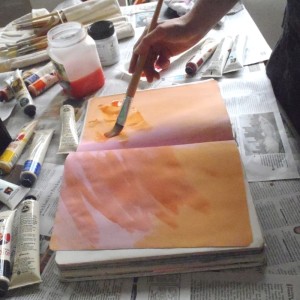
Inner Creative’s Natalia enjoys painting in her art journal as a hobby
So what do you do when you get home from work? Do you plonk yourself in front of the TV to zone out? Or do you carve out some time to spend on a hobby?
Any regular activity that you do for fun is considered to be a hobby. It can include such a wide range of activities, such as drawing, playing an instrument, learning a language, playing on an indoor cricket team, gardening, knitting, baking up a storm in the kitchen, or tinkering on your bike. According to conventional wisdom, hobbies are good for taking a break from our everyday pressures and releasing stress. They can also provide an opportunity for self-expression and creativity. And if you join a club or class, hobbies can provide a chance to meet new people and be social.
At its heart, having a hobby makes us feel good. We have something to look forward to doing at the end of a long day. Doing something we love means that we’re more likely to stick at it, and try new things to overcome the little bumps and challenges we come across while practising. Afterwards, we can feel more productive and that we’ve accomplished something (especially if we’ve forsaken time on TV or avoided getting sucked into the social media vortex 🙂 ). For me, the greatest reward comes from getting into that sweet spot (also known as getting into the zone or the flow) where time just stands still and I’m totally absorbed in whatever I’m doing. It feels fantastic.
So now we all know about the benefits of taking up a hobby and can see how hobbies can help us to flex our creative muscles. But did you know that having a creative hobby outside of work can actually help you be more creative and perform better at work?
Earlier this year, Kevin Eschleman (an organisational psychologies) and his colleges at San Francisco State University published a study in the Journal of Occupational and Organizational Psychology about the relationship between an employee’s performance at work and the creative activities they did out of hours. The employees were free to nominate what they considered to be their creative activity (which ranged from short story writing to playing video games). Eschleman found that doing a creative activity outside of work had a direct benefit on the employee’s job performance, such as through creative problem solving and being more helpful with other colleagues. Doing these creative activities also had an indirect effect by helping the employees to relax and recover from the demands of their jobs. The study participants also reported having an increased sense of control, being challenged to learn new transferable skills, as well as having the opportunity for self-expression and discovering something new about themselves.
From a manger’s or organisational viewpoint, it then makes sense to encourage staff to take up creative hobbies out of hours (just like many businesses recognise the importance of promoting healthy eating and exercise). Some organisations go as far as providing discounts or sponsorship to local creative courses or club memberships. However, given the hobby has to be something that captures the heart and mind of each individual, there’s no point mandating class attendance at a local art studio. Instead its about valuing people’s hobbies and interests outside of work, and where possible encouraging staff to share their creative efforts within their workplace (perhaps by displaying examples of people’s artwork and photography, or inviting people to bring in their magnificent cup cakes to share at team meetings or get togethers – in which case, everyone wins 🙂 ).
On a personal level, it shows how important it is to carve out some time for yourself on a regular basis to do a creative activity that you love. And when you’re significant other rants about all the time you spend on your hobby, then you can just say that you’re doing something to help you at work :-).
What’s a hobby that makes you feel creative? And when was the last time you spent some time on it?





